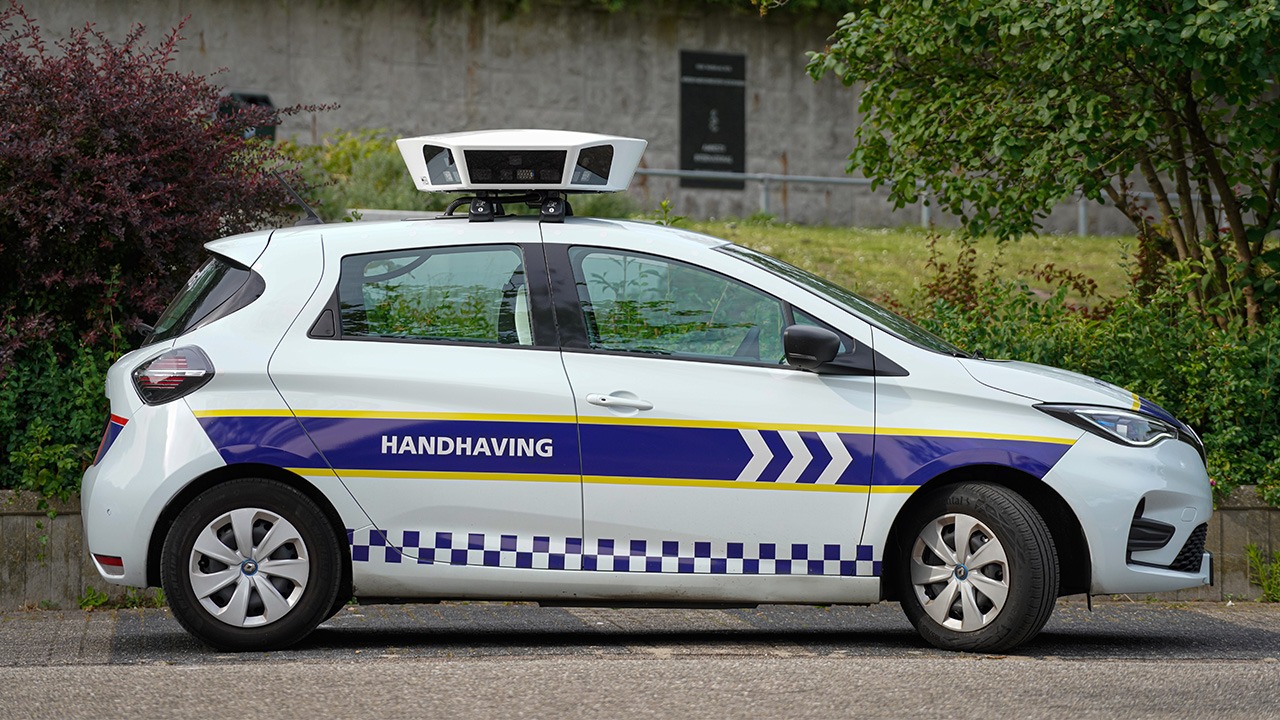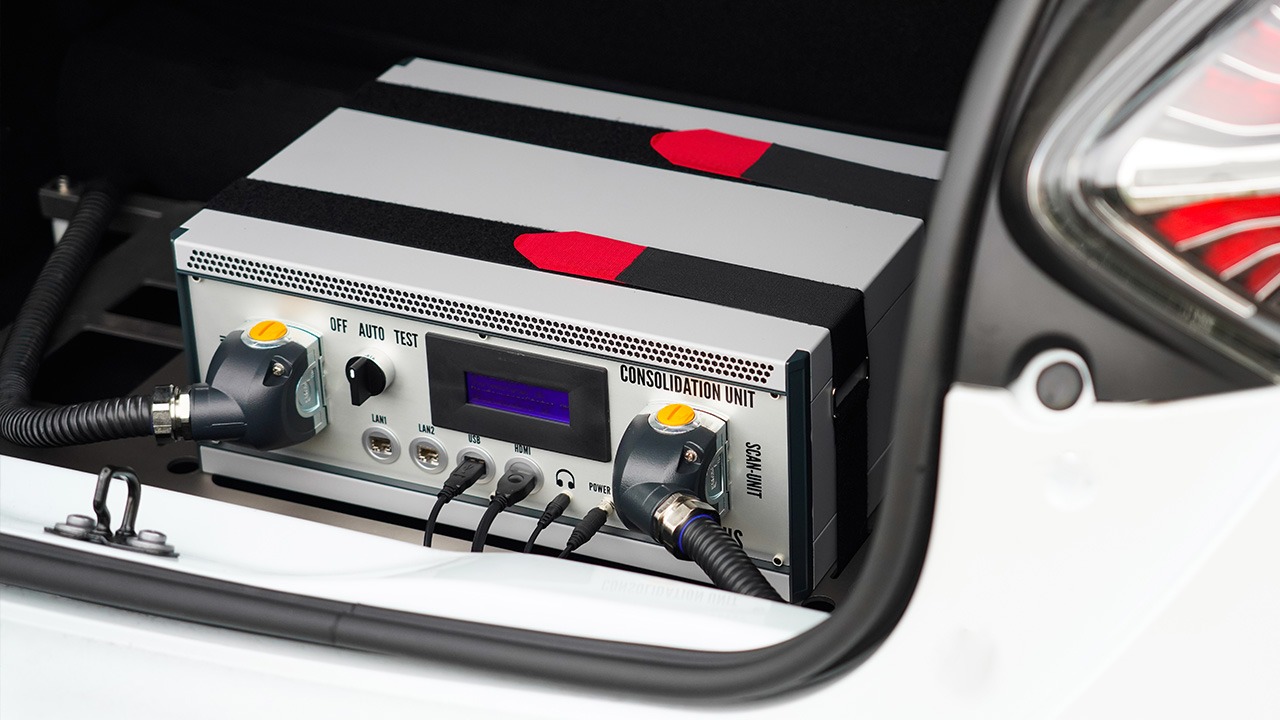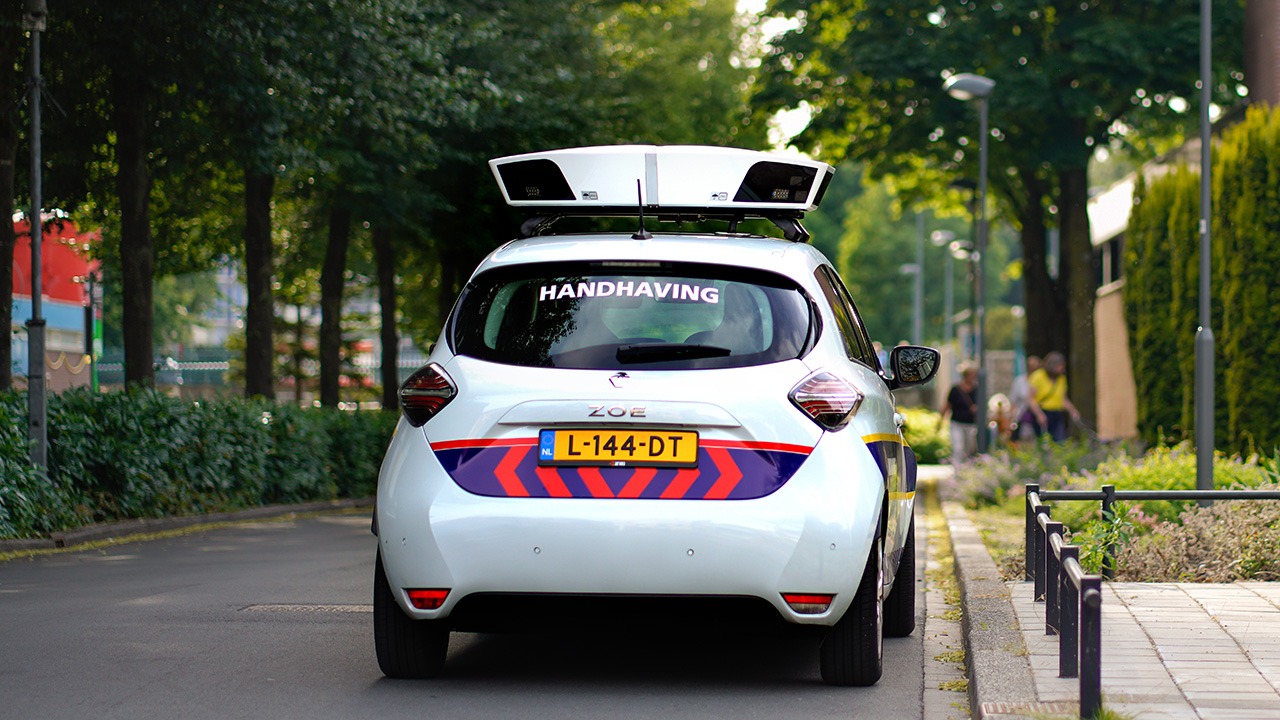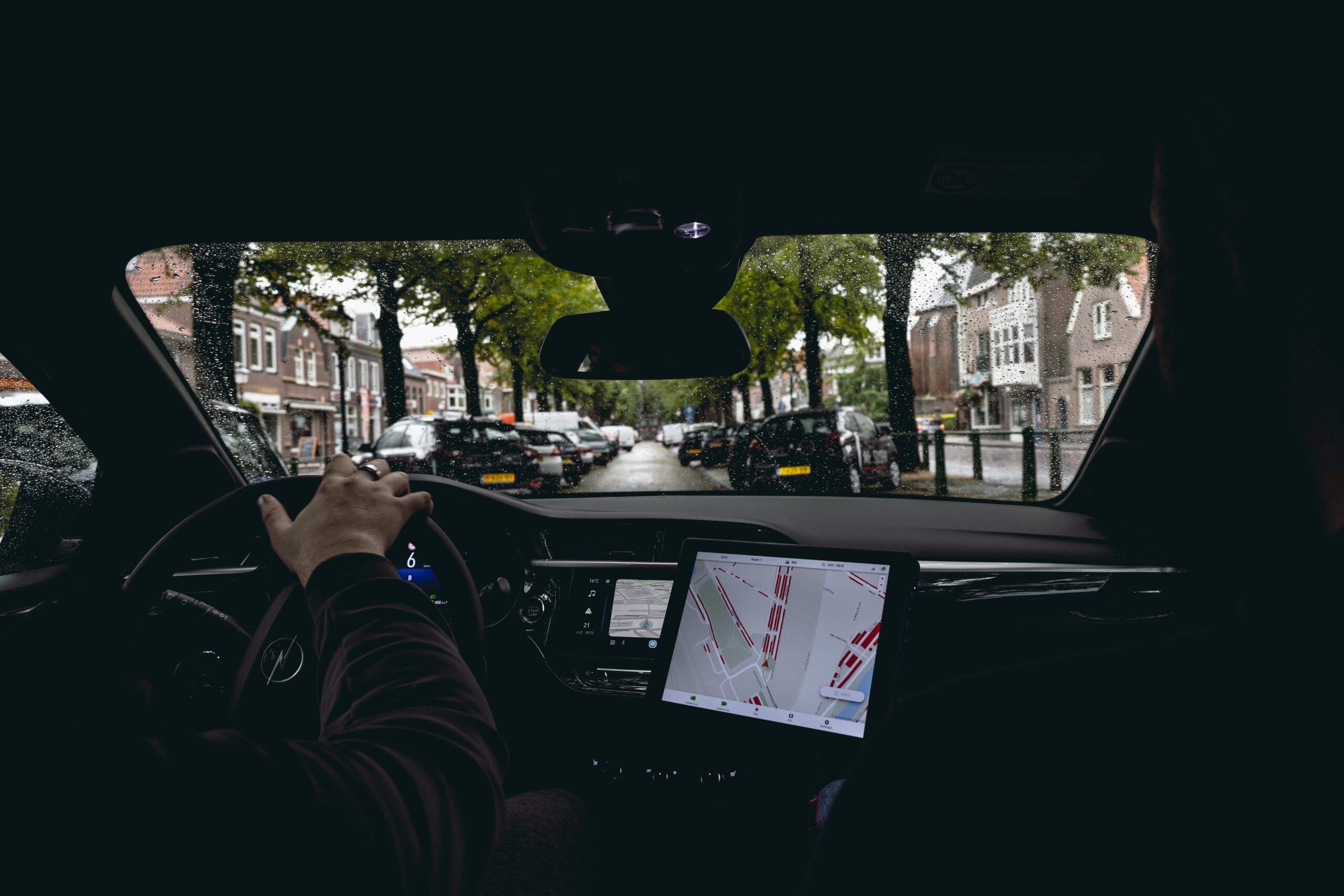SCAN CAR: FOR EFFICIENT PARKING ENFORCEMENT
SCAN CAR WITH BRICKYARD'S ENFORCEMENT SOFTWARE
On this page, we discuss the benefits of using scan cars for parking enforcement.
You'll discover the workings of this groundbreaking technology and how a scan car equipped with Brickyard's enforcement software can assist the municipality in upholding parking and traffic regulations to achieve compliance rates. We'll also highlight the advantages and applications of scan cars, and discuss the distinctions between this method and conventional enforcement. In essence, discover how scan cars can elevate enforcement measures and support your municipality.
WHAT IS A SCAN CAR?
A scan car is composed of two components: a partially modified regular (electric) vehicle and a scanning unit equipped with, among other things, an ANPR camera system, a highly accurate GPS unit, and panoramic cameras. Through standard 4/5G networks, the scanning unit interacts with Brickyard's enforcement software. Its purpose is to swiftly and effectively verify if vehicles within a designated area have purchased parking rights, have obtained parking permits or are parked appropriately.
THE OPERATION OF SCAN CARS
Scan cars are specially designed to quickly and efficiently scan large quantities of license plates. Using a scan car allows for easy monitoring of a wide area, resulting in increased compliance with parking rules and thus contributing to a higher willingness to pay. Hence, scan cars are an important part of parking enforcement. In this section, we further explore the workings of scan cars and the various steps involved in scanning license plates and processing data.
SCANNING OF LICENSE PLATES
Scanning license plates with scan cars is a relatively simple process. A scan car is equipped with special cameras that implement ANPR technology.
ANPR stands for "Automatic Number Plate Recognition." ANPR, along with other technologies, is used to automatically detect and read vehicle license plates.
After reading license plates, this information is forwarded to Brickyard's enforcement software, where a comparison and enrichment occurs using data from various databases. Determining whether a car is in a parking spot, whether it has parking rights, and what type of vehicle it is. This enables a quick and efficient decision-making process regarding further processing and follow-up of the scanned license plates.
THE OPERATION OF A SCAN CAR: IN STEPS
Below is a detailed description in steps of how a scan car operates for parking enforcement:
- The scan car navigates through designated zones within a municipality, like residential or parking areas. These area's are subject to a parking regime that needs to be enforced.
- Various types of cameras on the scan car (infrared, color, and panoramic cameras) automatically scan the license plates of all cars present in the area to be enforced.
- A Geographical position is linked to each license plate.
- The scanned data is securely transmitted to Brickyard's back office.
- Verification is done using a geographical map provided by the municipality, containing all relevant parking information to check if the GEO position of the license plate corresponds to a specific parking space.
- The system filters the data, queries the parking rights database, and retrieves vehicle specifications.
- If there are no parking rights or the vehicle is improperly parked, the vehicle is marked as a suspect (suspicious case).
- Suspects must be assessed by an enforcer or a boa. Consider, for example, violations of parking rules such as: paid parking, permit areas, parking on the sidewalk, blue zone enforcement, etc. etc
- If an offense is confirmed, it's registered in the system. The offense data is collected and forwarded to a processing authority of the municipality or the Central Judicial Collection Agency (CJIB) for processing.
- The processing authority imposes sanctions (warnings, fines, or tickets) on the license plate holder of the respective vehicle.
- If there's an objection against a warning, fine, or ticket, the scanned data is reviewed and reassessed.
- For statistical research (parking pressure measurement/payment willingness), data is anonymously stored, enabling Brickyard to generate relevant reports.


HOW SCAN CARS UNBURDEN THE MUNICIPALITY
It all starts with well-trained individuals. Brickyard consistently invests in training and guiding your employees. This training doesn't just enhance the utilization of current technologies but also emphasizes the incorporation of new advancements.
Well-trained individuals can effectively apply and share the required knowledge and skills, thereby optimizing the advanced enforcement systems, hardware, and software from Brickyard. As a result, the municipality is significantly relieved.
The municipality can now fully focus on its core tasks, resulting in a better living environment for its residents.
To achieve this vision, Brickyard employs various disciplines, such as consultancy, enforcement coordination, customer success management and application management. This team is responsible for maximizing knowledge transfer and providing guidance during operational execution.
Inklappen
VERIFYING PAID PARKING: FISCAL PARKING
What constitutes fiscal parking? When parking within the municipality, you might be required to pay a parking tax. This is termed as fiscal parking. Failure to pay this parking tax could result in a penalty notice, and the tax, plus an extra charge, will remain applicable. The Municipality issues the penalty notice, which can be disputed at the 'objection and appeal' division of the respective municipality.
Besides fiscal parking, a permit zone can also be subject to fiscalization. This is determined by municipalities in the General Local Regulations (APV), after which individuals in the area can purchase short-term parking rights, and residents, often through a permit system, can apply for a long-term permit. Enforcement with a scanning vehicle is similar to fiscal parking.
When a permit zone is not fiscalized, follow-up actions are needed where the notice is left on the vehicle. This means that the scanning vehicle detects the violator, and the enforcement officer leaves a penalty notice (using 'select') on-site (this concerns a so-called Mulder violation). Currently, there are several pilots across the country to enable this form of enforcement using DTE (Digital Traffic Enforcement). This means that the enforcement officer does not need to check on-site.
This principle is also applied for parking on the sidewalk.
Potential violators are always assessed by an authorized municipal enforcer in the Brickyard back office before a penalty is imposed.
ADDITIONAL SERVICES FOR THE MUNICIPALITY
Additional services provided by Brickyard to the municipality, after the delivery of the scan car:
- A tailor-made proven software solution custom-configured to meet the specific needs of the municipality
- Training and educational programs for the use of the associated scan car software
- Swift and accurate reporting, analysis and management of the collected data
- Integration with relevant systems and technologies
- Advice and consultancy in enforcement, data analysis and data management.
PRIVACY OF CITIZENS IN THE USE OF scan cars
Respecting citizen privacy stands as a priority for the municipality. Images taken by a scan car might contain sensitive information that needs safeguarding. To protect other parkers and passersby, it's vital to anonymize irrelevant data for the offense. Advanced blurring software identifies and obscures non-essential license plates and individuals in the images. The implementation of scan cars and Brickyard software adheres to the stipulations of pertinent privacy regulations like the GDPR. Hence, the utilization of scan cars maintains citizens' privacy without intrusion.
BENEFITS OF PARKING ENFORCEMENT WITH A SCAN CAR
A municipality conducting parking enforcement without a scan car may encounter various issues. Consider limited human capacity, human errors, low efficiency in manually checking parking zones, employee safety aspects; all these impose a heavy burden on the organization. Deployment of a scan car offers advantages and helps in solving the above issues.
1 - More efficient parking enforcement
scan cars perform thousands of scans hourly. The automatically scanned license plates are checked using Brickyard software. By integrating with local and national databases, these license plates can be processed swiftly and with greater efficiency.This allows municipal enforcers more time to focus on essential tasks.
2 - Reducing human errors in parking enforcement
Automated license plate scanning accelerates and enhances the precision of issuing fiscal surcharges. It minimizes human errors wherever feasible, resulting in more efficient and effective operations. Enforcers can always conduct follow-up checks, both remotely AND on-site.
3 - Improved compliance with parking rules
More efficient parking enforcement raises the risk for non-paying parkers and parking violators. The use of scan cars leads to increased willingness to pay for parking in the municipality and improves compliance with parking rules.
4 - Safety
Using scan cars reduces risks for civil servants in enforcing parking rules.
5 - Analysis
The data collected by scan cars also supports municipalities in policymaking. scan cars collect valuable anonymous parking data. Brickyard ensures you can analyze and act on that information.
6 - Comprehensive reporting options for parking enforcement
Within our intelligent Brickyard Desktop Enforcement environment, you easily generate reports on the collected data. These smart insights can support municipalities in creating policies for parking management and policies to improve the livability within the municipality.
POSSIBLE APPLICATIONS OF A SCANNING VEHICLE
Besides fiscal enforcement, the scan car also offers the municipality the opportunity for Mulder enforcement (minor traffic violations) such as:
- Notifying incorrect parking at taxi stands
- Short-term parking spots like kiss & ride areas, loading & unloading
- Disabled parking spaces
- Blue zone control
- Enforcement of environmental zones (Pilot)
- Enforcement of parking spaces intended for charging fully electric vehicles
- Standing on the sidewalk, footpath, bicycle path, bike/moped path, or bridle path (violation code R315b)
PERMIT CHECKS CAN BE PERFORMED WITH THE HELP OF SCAN CARS
The scan car can be used to check permits for disabled individuals, residents, and other permits or special parking arrangements and to detect violations.
ENFORCEMENT OF ENVIRONMENTAL ZONES WITH A SCANNING CAR (PILOT)
With the help of Brickyard software, scan cars can be used by the municipality to check whether vehicles, both cars and trucks, have access to an environmental zone.
An example: In Tilburg, as the first city in the Netherlands, the environmental zone is enforced with a scan car! Brickyard provides the integrated software platform here for both fiscal and environmental zone enforcement.


FOLLOW-UP OF VIOLATIONS
Assessing potential violations (suspects) registered by the scan car can be done using Brickyard software in various ways.
- Follow-up on the street
With Brickyard enforcement software, it's possible to easily organize street follow-ups with enforcement officers (boa). On a tablet, via the Select application, an enforcement officer is able to distinguish between different types of violations: fiscal suspects (violators of paid parking offenses) and Mulder suspects (perpetrators of minor traffic violations). If, as a municipality, you opt solely for fiscal enforcement, there's no need to deploy an enforcement officer for this check; a tax expert would suffice. - Through an application in the Brickyard back office.
In the Desktop Enforcement (DTE) application, information about potential violations is displayed to the enforcement officer in an office environment. Post-follow-up for parking violations using the DTE application is the most efficient way as it doesn't require on-street checks. - By utilizing a blend of the DTE app within the Brickyard back office alongside the Select app, you create an optimal setting to manage all feasible instances. All admissible instances are managed within the DTE environment. Naturally, some situations demand on-site follow-up and evaluation. This aspect is seamlessly arranged for you within the DTE - Select combination.
Contacteer ons

Benno Freriks
Account Manager
Benno is Account Manager voor alle handhaafoplossingen die Brickyard aanbiedt. Je kunt bij Benno terecht voor een doordachte antwoorden over:

Stanley de Rotte
Account Manager
Stanley is Account Manager voor alle handhaafoplossingen die Brickyard aanbiedt. Je kunt bij Stanley terecht voor een doordachte antwoorden over:
FREQUENTLY ASKED QUESTIONS ABOUT scan cars
A scan car is a partially modified regular vehicle with a scanning unit equipped with, among other things, an ANPR camera system, a highly accurate GPS unit, and panoramic cameras.
The scan car drives through an area where a parking regime applies and scans license plates. A GEO-position is linked to the license plates. Location, license plate, and are forwarded and checked for the presence of parking rights.
YES. Brickyard's technology is reliable. scan car technology is proven and has proven its value in many Dutch municipalities over many years.
NO. At Brickyard, it is not expensive. Customers can use a scan car via timesharing, where the costs for the vehicle, equipment, software, maintenance, operational costs, and other expenses are shared.
YES. Because (overview) images may contain privacy-sensitive information, Brickyard's blurring software makes irrelevant information unrecognizable for the violation. The use of scan cars and associated Brickyard software complies with the requirements of relevant privacy guidelines and legislation such as the GDPR. The municipality does not retain data longer than legally allowed.
scan cars are used for various purposes, such as: verifying paid parking (Fiscal parking) and Mulder enforcement such as: Signaling improper parking at taxi stands, Short-term parking spots like kiss & ride parking areas, loading & unloading areas, Disabled parking spaces, Control of blue zones, Enforcement of environmental zones (pilot), Enforcement of parking spaces intended for charging fully electric vehicles

